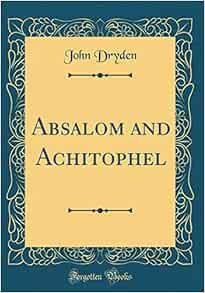Hello Readers,
This blog is a response to a task assigned by Dilip Barad sir (Department of English, MKBU). For more details of the task click here. This blog is about poem Absalom and Achitophel by John Dryden. Here few beginning lines from the poem and critical analysis of the same are discussed with the help of chat GPT.
About the poem Absalom and Achitophel :
Absalom and Achitophel is a celebrated satirical poem by John Dryden, written in heroic couplets and first published in 1681. The poem tells the Biblical tale of the rebellion of Absalom against King David; in this context it is an allegory used to represent a story contemporary to Dryden, concerning King Charles II and the Exclusion Crisis (1679–1681). The poem also references the Popish Plot (1678).
Few lines from the beginning of the poem :
In pious times, ere priest-craft did begin,
Before polygamy was made a sin;
When man, on many, multipli'd his kind,
Ere one to one was cursedly confin'd:
When Nature prompted, and no Law deni'd
Promiscuous use of concubine and bride;
Then, Israel's monarch, after Heaven's own heart,
His vigorous warmth did variously impart
To wives and slaves: and, wide as his command,
Scatter'd his Maker's image through the land.
Michal, of royal blood, the crown did wear;
A soil ungrateful to the tiller's care:
Not so the rest; for several mothers bore
To god-like David, several sons before.
But since like slaves his bed they did ascend,
No true succession could their seed attend.
Critical Analysis :
The opening lines of John Dryden's "Absalom and Achitophel" are a masterful
example of satirical wit and historical commentary. Here's a critique of these lines:
1. Satirical Tone : Dryden employs a satirical tone from the very beginning. He subtly mocks the shifting moral and religious standards over time by describing an era "ere priest-craft did begin" when polygamy was acceptable, contrasting it with the contemporary view that condemns it as a sin. This sets the stage for the satirical exploration of hypocrisy and political maneuvering.
2. Historical and Biblical Allusion : Dryden effectively uses historical and biblical allusions to draw parallels between the past and the present. By referencing King David as "Israel's monarch" and portraying him as a figure who had multiple wives and concubines, Dryden creates a satirical commentary on the changing moral landscape of both biblical and contemporary society.
3. Critique of Religious and Political Hypocrisy : These lines serve as a critique of religious and political hypocrisy. Dryden implies that moral standards are subject to manipulation and change based on political motivations and religious interests. The condemnation of polygamy in his contemporary society, while it was accepted in biblical times, highlights the malleability of moral principles.
4. Exploration of Succession and Legitimacy : Dryden subtly raises questions about the legitimacy of heirs and succession. He hints that the offspring of King David's numerous unions may not be considered legitimate successors due to evolving societal norms. This underscores the arbitrary nature of determining legitimacy in both political and religious contexts.
5. Irony and Social Commentary : Dryden uses irony to highlight the irony of shifting moral values and the role of political and religious authorities in shaping those values. His commentary extends beyond biblical history to address the political and religious climate of his own time, where moral standards were influenced by political power struggles.
In summary, these opening lines of "Absalom and Achitophel" effectively set the
stage for the satirical exploration of shifting moral values, religious and political
hypocrisy, and the arbitrary nature of legitimacy. Dryden's use of wit, historical
references, and irony engages the reader in a thought-provoking critique of both
past and contemporary society.
Work cited :

.jpg)
.jpg)
.jpg)
No comments:
Post a Comment